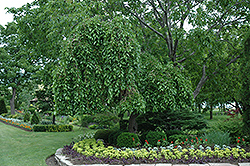It's all about ...
plants

Height: 10 feet
Spread: 15 feet
Sunlight:
![]()
![]()
![]()
Hardiness Zone: 5a
Other Names: White Mulberry
Description:
An unusual accent tree with a twisted weeping habit of growth, rather quaint when young but becomes wide-spreading and prominent when mature, best used as a solitary feature; very adaptable to many conditions, fruits can be messy and prolific
Ornamental Features
Weeping Mulberry is primarily valued in the landscape or garden for its highly ornamental weeping form. It has rich green deciduous foliage. The pointy leaves turn yellow in fall. The red fruits are held in clusters in mid summer. The fruit can be messy if allowed to drop on the lawn or walkways, and may require occasional clean-up.
Landscape Attributes
Weeping Mulberry is a multi-stemmed deciduous shrub with a rounded form and gracefully weeping branches. Its relatively coarse texture can be used to stand it apart from other landscape plants with finer foliage.
This shrub will require occasional maintenance and upkeep, and usually looks its best without pruning, although it will tolerate pruning. It is a good choice for attracting birds to your yard. Gardeners should be aware of the following characteristic(s) that may warrant special consideration;
- Messy
Weeping Mulberry is recommended for the following landscape applications;
- Accent
Planting & Growing
Weeping Mulberry will grow to be about 10 feet tall at maturity, with a spread of 15 feet. It has a low canopy with a typical clearance of 2 feet from the ground, and is suitable for planting under power lines. It grows at a fast rate, and under ideal conditions can be expected to live for 40 years or more.
This shrub performs well in both full sun and full shade. It is very adaptable to both dry and moist locations, and should do just fine under average home landscape conditions. It is considered to be drought-tolerant, and thus makes an ideal choice for xeriscaping or the moisture-conserving landscape. It is not particular as to soil type or pH, and is able to handle environmental salt. It is highly tolerant of urban pollution and will even thrive in inner city environments. This is a selected variety of a species not originally from North America.
This plant is not reliably hardy in our region, and certain restrictions may apply; contact the store for more information.
